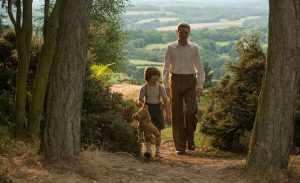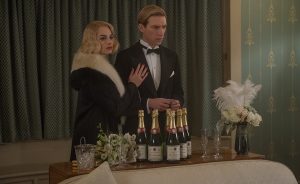![]() The second biopic to be released this week (along with Only the Brave) involves the creator of famous literary character Winnie the Pooh. Goodbye Christopher Robin chronicles the personal events in author Alan Milne’s life that led to the creation of the fictional bear, as well as the consequences the success of the books had on the scribe’s family. It’s a decent picture, although one that has an overly slick and polished appearance that adds a layer of artifice and separation to the proceedings.
The second biopic to be released this week (along with Only the Brave) involves the creator of famous literary character Winnie the Pooh. Goodbye Christopher Robin chronicles the personal events in author Alan Milne’s life that led to the creation of the fictional bear, as well as the consequences the success of the books had on the scribe’s family. It’s a decent picture, although one that has an overly slick and polished appearance that adds a layer of artifice and separation to the proceedings.
 As the film begins, English writer Alan Milne (Domhnall Gleeson) finds himself in creative trouble. A WWI veteran struggling with trauma, he wants to write about the horrors of war, but doesn’t find any support for the cause from publishers or his socialite wife, Daphne (Margo Robbie). For his own mental health, Milne insists on moving to the country, which enrages his spouse even further. As events progress, the lead is forced to spend more time with his young son Christopher (Will Tilston). After being introduced to the child’s stuffed animals, inspiration strikes, leading to a bestselling worldwide phenomenon.
As the film begins, English writer Alan Milne (Domhnall Gleeson) finds himself in creative trouble. A WWI veteran struggling with trauma, he wants to write about the horrors of war, but doesn’t find any support for the cause from publishers or his socialite wife, Daphne (Margo Robbie). For his own mental health, Milne insists on moving to the country, which enrages his spouse even further. As events progress, the lead is forced to spend more time with his young son Christopher (Will Tilston). After being introduced to the child’s stuffed animals, inspiration strikes, leading to a bestselling worldwide phenomenon.
 As mentioned, early scenes aren’t particularly engaging. Admittedly, the characters are intended to be introduced as stiff and unaffectionate, but their behavior and the entire production looks so glossy that one feels like the characters might actually be in a storybook themselves. The Daphne role doesn’t give co-star Robbie much to work with. Besides buying stuffed animals for Christopher, the actress has little to do in the film except be one of the nastiest and more insensitive wives ever captured on film.
As mentioned, early scenes aren’t particularly engaging. Admittedly, the characters are intended to be introduced as stiff and unaffectionate, but their behavior and the entire production looks so glossy that one feels like the characters might actually be in a storybook themselves. The Daphne role doesn’t give co-star Robbie much to work with. Besides buying stuffed animals for Christopher, the actress has little to do in the film except be one of the nastiest and more insensitive wives ever captured on film.
However, if one can endure the rough opening twenty minutes, things do improve as Milne begins to brainstorm and let his personal guard down. Gleeson ably communicates the father’s inner torment and shellshock as loud noises cause intense distress and frantic behavior. His famous characters aren’t explicitly shown, but the stuffed animals that inspired them play a significant part. As the writer becomes more and more invested in the stories and characters, viewers learn some interesting observations about their invention.
 Another interesting aspect comes after the book’s publication. It’s such a smash that the success causes even more trouble, putting the family in the public spotlight and forcing Christopher (the inspiration for the main character in the book) to be sent away on press tours. The parallels between the media attention back then and today are fascinating. Things clearly haven’t changed all that much, and these unanticipated complications result in negative consequences.
Another interesting aspect comes after the book’s publication. It’s such a smash that the success causes even more trouble, putting the family in the public spotlight and forcing Christopher (the inspiration for the main character in the book) to be sent away on press tours. The parallels between the media attention back then and today are fascinating. Things clearly haven’t changed all that much, and these unanticipated complications result in negative consequences.
Another plus is the work of Kelly MacDonald as the family nanny, who essentially ends up raising Christopher while the parents become obsessed with their own priorities (writing in the case of Milne, and keeping up with social events on the part of the wife). The nanny is given a pretty on-the-nose speech that details the numerous flaws of her employers, but the performer manages to deliver it with aplomb.
 In the end, Goodbye Christopher Robin is perfectly serviceable, much like recent films including The Founder, Saving Mr. Banks and Woman in Gold (the latter of which was helmed by the director of this film). This is a borderline call, but I’m going to give it a pass based on its second act, which does offer absorbing family drama. Those curious about the life of Milne may find it intriguing, but don’t expect an Oscar-caliber biography.
In the end, Goodbye Christopher Robin is perfectly serviceable, much like recent films including The Founder, Saving Mr. Banks and Woman in Gold (the latter of which was helmed by the director of this film). This is a borderline call, but I’m going to give it a pass based on its second act, which does offer absorbing family drama. Those curious about the life of Milne may find it intriguing, but don’t expect an Oscar-caliber biography.


